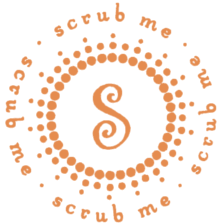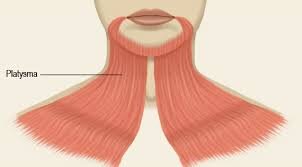What's Rolfing? Can it make you look & feel younger?
Dr. Ida P. Rolf.
A few months ago this awesome woman named Katy visited my studio for a facial. As we chatted I learned she had recently moved here from Colorado where she received her certification in Rolfing. I was a little familiar with this form of tissue & fascia manipulation but was interested to learn more from a trained professional. The extent of what I knew about this wellness practice is that it’s similar to, but not the same as physical therapy or clinical massage. Of course, I had to inquire about the ways rolfing could benefit our neck & face and if it could help lift and smooth that tissue. Katy had great information for me and invited me to her workspace to experience some head, neck, and face structural integration for myself!
scrub me secret: Throughout this post, you’ll sometimes see me refer to Rolfing as structural integration. Structural integration is the general term used for this type of tissue and fascia work; Rolfing is a specific kind of this practice and seems to be the most well-known form of structural integration. Rolfing is named after Dr. Ida Rolf who was at the forefront of this form of body therapy.
What is Rolfing?
Rolfing is a hands on therapy similar to, but not the same as, massage and physical therapy.
Rolfing is a form of bodywork therapy that aligns and reorganizes the body by paying special focus to the connective tissue. This connective tissue is called fascia and our fascia spreads throughout the entire body. Ida P. Rolf developed this type of bodywork therapy because she felt that total alignment in the body was key in healing pain or ailments that we experience. There are different ways of practicing and performing this structural integration fascia manipulation but Rolfing specifically seems to be the most popular and well known.
A Rolfing therapist uses a firm, deep touch to manipulate and realign the connective tissue that runs throughout your body. Think of it as something similar feeling to a deep tissue or sports massage.
scrub me secret: Katy explained that many Rolfers use a very firm, deep touch and some do not. Some Rolfers instead focus mostly on movement and more perceptive work. Rolfing does have a reputation for being painful, and it's really important to Katy that people not be in pain during their therapy.
In a Rolfing session, your therapist will do an assessment for you to best figure out what needs to be treated. Katy explained to me that it will take continual sessions and each time your body will be worked on a bit differently or in a different area. The theory is that in order to truly fix your posture, aches, or muscle ailments it’s best to fully realign your fascia throughout your entire body. For example, back pain that you are having may be alleviated by aligning your connective tissue in other places on your body like neck, shoulders, legs, etc. Your Rolfing therapist may also give you the tools you can use at home or in your everyday life to help achieve your best alignment. This could include certain exercises or instructions on how to sit, stand, or move differently.
scrub me secret: Rolfing has what is called a 10 series. the 10 series is a set of ten treatments that are meant to be the “perfect recipe” to get total body alignment. During the 10 series, your entire body is worked on during different sessions. you can learn more about this series at rolf.org.
How rolfing can benefit you:
Rolfing is all about alleging the body.
If you struggle with the alignment of the body, muscle pains, or problems with your posture Rolfing can help. Katy says that she often works with clients who have a job that requires them to be at a desk or on a computer for long amounts of time. Jobs like this can have a negative effect on your posture and alignment that leads to life long discomfort. Things like injury or other strains on the body can leave your muscles and tissues out of sorts and needing help to get back to where your body needs them to be. If you struggle with reoccurring aches, pains, bad posture, or if you’re feeling out of alignment then Rolfing would be something great for you to try. Structural integration is a total body wellness practice that focuses on helping you move and feel the best; it’s definitely not meant to be thought of as a treatment that focuses on esthetics but you definitely can receive some results that will help you look better as well as feel better. When your posture is great and your body feels discomfort-free I think that can make someone look so much more radiant! Facial rolfing is also a thing, and yes it can provide some of those facial lifting and smoothing benefits we are always searching for.
Facial rolfing. Can it help you look younger?
Facial Rolfing is similar to a European lifting facial massage that I would perform at the skin care studio. A typical European facial massage from an esthetician is where your technician uses a fairly firm pressure to stimulate skin and lift facial tissues. Katy explained to me that during facial Rolfing the practitioner slowly manipulates, lifts, and rearranges the connective tissue in the neck and face. This can help your neck and face look younger in two different ways! Taking the time to really lift and manipulate the neck & facial tissues helps to make you look lifted and youthful. Also, releasing tension that lives in your head, face or jaw can let your face and neck rest the way it’s supposed to. This can result in slightly less sagging. While facial massage and facial Rolfing are similar each therapy can benefit you differently; I suggest trying both! Check out my blog post that goes a little more in-depth on the benefits of massage.
scrub me secret: When working on the neck, head, and face Katy says she works a lot on something called the platysma. Our platysma is a broad area of muscle fibers and tissue that cover our decolletage, collarbone, neck, and jawline. Working with this area of muscle and realigning everything can help with jaw pain and head & neck movement. This is also important in helping our neck area to look smoother.
My Rolfing experience with Katy:
I visited Katy’s business Body in Practice at her space located in the loop in Chicago; her space was really serene and had great energy. I chatted with Katy before our meeting and told her I wanted to focus on mainly facial Rolfing, I was really interested to see how it felt and the differences compared to esthetics facial massage. This is a little out of the norm of how Katy usually works; she is typically treating clients who have body ailments, not those wanting to get a little facelift, but she was happy to work with me and educate. She started by performing some Rolfing on my scalp to start to loosen and align the tight fascia there. I didn’t know my scalp and head was holding so much tension but I felt the release soon after she started! Katy’s touch is very intuitive, it’s like her hands and fingertips know exactly where to go, a really great trait for a bodywork therapist to have.
scrub me secret: a little insider rolfing info that Katy had for me was that rolfers will often notice when people first start their structural integration treatments, their heads feel hard to the touch, like a coconut. after some muscle and tissue release, rolfers will feel the texture of the scalp slightly soften and relax; the head then feels closer to the texture of a firm melon vs. a coconut. I thought this was a cool and interesting anecdote.
Katy then worked on my décolletage and neck, moving her hands slowly to release tension there. It makes sense that to work on my face she also wanted to treat the connective tissue in my head, neck, and décolletage since all fascia is connected throughout the body. When she started working on my face I noticed she didn’t use any type of oil or lotion, Katy says this is best for really feeling the fascia and how it moves and releases. She focused around my jawline and cheek area of my face and explained to me during the treatment what she was working on. She wants the experience to be relaxing but also educational so the client can get the best results possible. While she Rolfed me she discussed certain habits that will cause the fascia in our face to sag or move out of alignment, this discussion reminded me a lot of a blog I write called “What’s Giving you Wrinkles?”. I enjoyed this short treatment with Katy a lot, I can definitely see how Rolfing could really help and feel amazing when you’re wanting to treat TMJ or body pain.
I learned so much about Rolfing from Katy in our short meeting and picked up a few new movements I’d like to use in my facial massages. I’ve just gotten a small taste of what Rolfing is and how it can benefit us so I’m looking forward to diving deeper into this topic and learning even more! Something we discussed that I am super interested in is Rolfing the face and jaw by using your hands inside the mouth as well as on the face. This is the next thing on my list to research more and try out because it sounds like we could really do some major anti-aging with that type of facial Rolfing.
scrub me secret: a buccal massage is a facial massage where your technician massages your face and jaw from inside your mouth. buccal massage has actually gained some mainstream popularity lately because there is word that this is one of Meghan Markle’s go-to treatments. You all definitely can guess what my next blog post is going to be about, buccal massage!
If you’d like to visit Katy for a consultation, a Rolfing treatment, or to start a 10 series click this link to get in touch with her! You can also follow Katy on Instagram at @bodyinpractice.rolfing.





